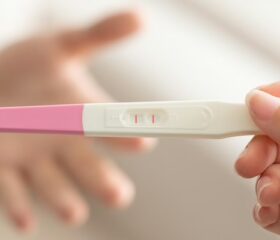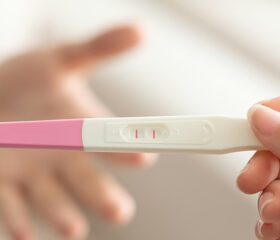LH Surges and Peaks: When and How They Affect Ovulation
When you’re trying to conceive, timing is everything, but it can be tricky to know when the right time to have sex is. Fortunately, your body gives you a clue in the form of a luteinizing hormone (LH) surge.

- What is luteinizing hormone?
- When does the LH surge occur, and how long does it last?
- Do high levels of LH mean you’re pregnant?
- How to identify your LH surge with ovulation tests
- Ovulation tracking methods that don’t look for an LH surge
- When should you speak to your doctor about your LH surges?
- Final thoughts
A spike in LH is one of the primary signals of ovulation, and by identifying when it surges, you’ll be able to figure out your most fertile days. Here’s everything to know about this essential hormone, from what it is to what it means for your fertility and chances of getting pregnant.
What is luteinizing hormone?
Luteinizing hormone (LH) is produced and released by your pituitary gland, a small gland at the base of your brain. LH stimulates processes in your body related to puberty, your sex drive, and reproduction.
What is an LH “surge”?
In the early days of your monthly hormonal cycle (closer to your period), your levels of LH are relatively low. As you get closer to ovulation, your pituitary gland produces more LH, which triggers your ovarian follicles (the small sacs in your ovaries that contain eggs) to release a mature egg. This is known as the LH surge. 1
If you’re tracking your fertile days with ovulation tests, also known as ovulation predictor kits (OPKs), what you’re technically doing is monitoring your LH levels (more on this later).
When does the LH surge occur, and how long does it last?
Your LH surge will generally occur approximately 16–36 hours before you ovulate. 2 If, like many women, you have a 28-day menstrual cycle, you’ll usually ovulate around day 14.
Once your ovary releases a mature egg, it’s viable (capable of being fertilized) for about 12 to 24 hours. 3
Sperm can survive in the female reproductive tract for up to five days. This means your fertile window (the days you’re most likely to conceive) consists of:
- The 5 days leading up to ovulation
- The day you ovulate
- The day afterward
After ovulation, your LH levels decrease rapidly, and your body begins producing another hormone called progesterone, which thickens the lining of your uterus so a fertilized egg can implant in it. 4
Know the difference between LH “surges” and “peaks”
The “LH peak” refers to the point when your luteinizing hormone reaches its highest concentration during the surge. The surge itself is the overall rise in LH. For many women, the surge might last a day or two, with one distinct peak.
Do high levels of LH mean you’re pregnant?
LH isn’t used to determine whether you’re pregnant. Both home pregnancy tests and the blood tests your doctor performs look for the hormone human chorionic gonadotropin (hCG), which your body produces soon after implantation occurs (when a fertilized egg implants in your uterine lining).
However, LH’s molecular structure is very similar to hCG’s. If you’re tracking ovulation using ovulation test strips (more on this later), your test could misinterpret hCG for LH. This could cause your ovulation test to be positive if you’re pregnant.
When this happens, it’s always accidental and is not the primary purpose of the ovulation test. You shouldn’t rely on LH as a way to figure out if you’re pregnant. Always use a few actual pregnancy test strips to double check.
How to identify your LH surge with ovulation tests
One of the most common and accessible ways to detect your LH surge is by using ovulation tests. Again, OPKs detect the increase in LH in your urine.
How to use an ovulation test
To use an ovulation test, you either need to stick the test strip directly into your urine stream or place it in a sample of your urine (e.g., in a disposable cup). Always carefully read the instructions for your chosen OPK brand.
Most OPKs have a test line and a control line. The control line shows the test is working correctly. The test line will darken as your LH levels increase. If you have a positive ovulation test result, the test line will be as dark as or darker than the control line, indicating you’re due to ovulate soon.
Most of the time, you’ll have a high chance of getting pregnant when you see a positive ovulation test result, so you’ll want to have sex soon after getting one.
Do ovulation tests confirm you’re going to ovulate?
Ovulation tests are accurate when it comes to detecting high levels of LH in your body, but they don’t absolutely confirm that you’re about to ovulate.
Sometimes, medical conditions can increase your levels of LH—even if you aren’t approaching ovulation.
For instance, polycystic ovary syndrome (PCOS) can cause you to have chronically elevated levels of LH or unusual surges throughout your cycle. 5 As a result, it’s difficult to track when you’re ovulating with PCOS (which is part of why getting pregnant with PCOS is a little complicated, although it’s still possible).
Other reasons an OPK might not perform correctly
Even if you don’t have a condition like PCOS, you might not find ovulation tests useful if you have irregular, unpredictable periods or are getting close to menopause. Talk to your doctor if you’re in one of those situations and you want to get a handle on your cycle to predict your fertile window.
It’s also worth noting that if you’re using hormonal birth control (which you probably aren’t if you’re trying to conceive), it completely disrupts ovulation, so you won’t be able to identify an LH surge.
Ovulation tracking methods that don’t look for an LH surge
Outside of identifying an LH surge, there are other useful tools, signs, and methods you can use to pinpoint when you’re ovulating:
- Ovulation calculators: An ovulation calculator estimate when you’re going to ovulate based on the date of your last period. Most calculators work under the assumption that you have a regular 28-day cycle, which is the case for many women, but by no means all. If you want to track ovulation with irregular periods, speak with your doctor for more tailored advice.
- Basal body temperature (BBT): Your BBT is your body’s resting temperature, which you can take first thing in the morning. Proponents of this method claim that your BBT rises slightly when you’re ovulating, and that tracking it over the course of several months makes it possible to predict your cycle, although the scientific evidence for this is a little shaky.
- Ovulation symptoms: Don’t be surprised if ovulation makes you feel tired. Some women also experience abdominal pain (mittelschmerz), bloating, and an increased libido. Here again, this isn’t universally true, but the presence of some or all of those symptoms can be suggestive.
Keep in mind that these methods are generally less reliable than using ovulation tests. For the best chances of success, try to use multiple methods simultaneously, which you can often combine in fertility tracker apps for easy reference.
When should you speak to your doctor about your LH surges?
Most women, even those with irregular cycles, can track their LH surges without medical intervention. That being said, there are instances where you should speak with your doctor, particularly if:
- You don’t detect an LH surge for three consecutive cycles, which could indicate anovulation (you’re not ovulating at all)
- You consistently get positive results on your ovulation tests, indicating your baseline levels of LH are very high
- You have highly irregular periods
- You’ve been actively trying to conceive for 1 year (or six months if over 35) without success
- You’re over 40 and want to conceive
Your doctor may perform an LH test, potentially alongside a follicle-stimulating hormone (FSH) test.
FSH is one of the other essential hormones for ovulation, as it stimulates your ovarian follicles to mature your eggs before they’re released. 1 This test isn’t universally done, and is more commonly performed by fertility specialists planning on doing procedures such as intrauterine insemination (IUI) or in vitro fertilization (IVF).
Your doctor can also perform a blood test and check over your medical history to see if there’s an underlying issue that could be causing problems with ovulation or infertility.
What are normal LH levels at each stage of your menstrual cycle?
Every woman’s body is different, so you may naturally have higher or lower baseline LH levels, as well as different peaks. If your doctor performs a blood test to check your LH levels, they’ll compare them to the average levels you can expect at each stage of your cycle: 1
| Stage of cycle | LH levels in international units per liter (IU/L) |
|---|---|
| Weeks 1 and 2 | 1.37 IU/L–9 IU/L |
| Week 2, before ovulation | 6.17 IU/L–17.2 IU/L |
| Weeks 3 and 4 | 1.09 IU/L–9.2 IU/L |
| After menopause | 19.3 IU/L–100.6 IU/L |
| Men | 1.42 IU/L–15.4 IU/L |
These numbers just give you a general idea of what to expect, and your levels could also vary depending on your age and medical history. You can discuss in more detail with your doctor what your individual LH levels mean for you.
What if you have very low LH levels?
If you can’t identify an LH surge or are consistently seeing low levels, either on your home ovulation tests or blood tests your doctor performs, it could mean that your pituitary gland isn’t producing enough of the hormone. Low LH levels could be signs of: 1
- Kallmann syndrome: This rare condition causes your body to produce insufficient estrogen and testosterone. This, in turn, causes delayed puberty and can affect your sense of smell.
- Hypothalamic amenorrhea: This happens when a problem with your hypothalamus stops you from getting your period by interfering with your hormonal production or regulation. It’s often caused by factors like excessive exercise, stress, or poor nutrition.
Can you still get pregnant naturally with low LH levels?
Yes—just because you may have slightly lower LH levels, that doesn’t necessarily mean you can’t get pregnant. As mentioned, some women have lower baseline levels than average but can still ovulate. Your doctor can give you tailored guidance about how your individual LH levels affect your fertility.
What if you have very high LH levels?
On the other end of the spectrum, consistently high levels of LH could also indicate an underlying issue. As mentioned earlier, many women with PCOS have chronically elevated LH levels, though this can also be caused by genetic conditions such as Turner syndrome or Fragile X syndrome. 1
As mentioned earlier, very high levels could also mean that you’re approaching or are in menopause, in which case you probably won’t be able to conceive. 6
Final thoughts
Who’d have thought that one hormone could have such a profound effect on your chances of getting pregnant? Identifying your LH surge lets you know when to time sex and greatly increases your likelihood of getting that bun in the oven.
If you’re struggling to get to grips with your hormonal surges, your doctor is always on hand to give you advice.
Article Sources
- Cleveland Clinic. "Luteinizing Hormone" Retrieved August 12, 2025.
- ColumbiaDoctors. "Find Your Ovulation Day" Retrieved August 12, 2025.
- Cleveland Clinic. "Ovulation" Retrieved August 12, 2025.
- UCSF Health. "The Menstrual Cycle" Retrieved August 12, 2025.
- Natural Womanhood. "The Telltale Chart: Patterns and symptoms that point to PCOS" Retrieved August 12, 2025.
- Saint Luke’s. "Luteinizing Hormone (Blood)" Retrieved August 12, 2025.







